18.30 Election day recap
We’re about to close the blog for today, so here’s a quick summary of the main points:
MAIN POINTS:
- Giorgia Meloni’s far-right Brothers of Italy party is the clear winner with around 26 percent of the vote
- The hard-right coalition led by Brothers of Italy is set to take 44 percent of vote altogether
- Italy’s Interior Ministry is expected announce official results on Monday evening
- Right-wing coalition looks unlikely to reach ‘super majority’ in parliament
- Meloni on course to become Italy’s first woman prime minister
We still don’t have an official announcement, but the result is clear. As the count progresses, near-final results show Brothers of Italy have won the most votes with around 26 percent.
Their right-wing coalition takes the biggest share of the vote by far at 44 percent, with anti-immigrant League of Matteo Salvini at around 9 percent and Silvio Berlusconi’s conservative Forza Italia taking around 8 percent.
As the party with the biggest share of the vote within the coalition, Meloni is on course to be named Italy’s first woman prime minister, leading a government with a large majority in parliament.
The coalition was hoping to win an unprecedented two-thirds majority – a ‘super majority’ that would allow it to make changes to the constitution without a public vote. But projections based on votes counted so far show that they’re likely to fall short of the thresholds for this.
Here’s a detailed look at what the new government will likely mean for Italy.
16.40 How are financial markets reacting to the election results?
Investors oscillated between concern and caution Monday after election victory for far-right leader Giorgia Meloni, whose instability has long worried the markets.
The Milan index was up 0.86 percent in mid-afternoon trading, the best performance among European stocks, but Italy’s ten-year borrowing rate rose to 4.52 percent, the highest since October 2013.
Reflecting investors’ lingering concerns over the country’s huge debt, the closely watched ‘spread’ – the gap between Germany’s ten-year borrowing rate and that of Italy – increased by 6.65 percent to 235 points.
However, “the rise of the spread is moderate. There will be some sort of wait and see approach, markets want to know what Meloni has on her mind before they react”, Nicola Nobile of Oxford Economics told AFP.
“Markets work on the assumption that she will continue with the status quo… But if she goes crazy about fiscal measures, markets will react very strongly.”
By comparison, shortly after former European Central Bank chief Mario Draghi took over as Italian prime minister in February 2021, the spread fell below 100 points for the first time since 2015.
15.50 – France ‘respects’ Italian election result, says Macron
French President Emmanuel Macron has reacted to the election result, saying he respects the “democratic choice” of the Italian people after an election victory for the far-right Brothers of Italy.
“The Italian people have made their democratic and sovereign choice. We respect it,” Macron said in a statement from his office. “As countries that are neighbours and friends, we must continue to work together.”
15.40 – US reacts to election results
The US is awake now, and Secretary of State Antony Blinken said his administration looked forward to working with Meloni’s new government – but would encourage respect for human rights.
“We are eager to work with Italy’s government on our shared goals: supporting a free and independent Ukraine, respecting human rights and building a sustainable economic future,” Blinken wrote on Twitter.
“Italy is a vital ally, strong democracy and valued partner,” he said.
Meanwhile, US far-right and alt-right commentators reacted with glee to the news of Meloni’s victory.
So beautifully said.
Congratulations to Giorgio Meloni and to the people of Italy. https://t.co/XdM8U2mFgt
— Rep. Marjorie Taylor Greene🇺🇸 (@RepMTG) September 26, 2022
A Meloni-led government is likely to have plenty in common with the previous Trump administration – after all, former Trump advisor Steve Bannon played a role in raising Meloni’s profile while in Europe in 2018-19.
15.30: Russia ‘open’ to ties with Meloni government
The Kremlin said on Monday that Moscow was open to developing “constructive” ties with Rome after the victory of far-right leader Giorgia Meloni in Italy’s general election, AFP reports.
“We are ready to welcome any political forces that are able to go beyond the established mainstream, which is filled with hate for our country… and show willingness to be constructive in relations with our country,” Kremlin spokesman Dmitry Peskov told reporters when asked about Meloni’s victory.
Despite her Eurosceptic stance, Meloni has backed European sanctions against Russia and the sending of weapons to Kyiv – though in 2014 she voiced her support for Russia’s annexation of Crimea, so it’s not clear how credible her stance is or if it could change.
READ ALSO: Russian embassy highlights Italian political ties ahead of vote
Her coalition partners Matteo Salvini and Silvio Berlusconi are well known for their longstanding ties to Russia.
Berlusconi last week caused outrage by defending his old friend Vladimir Putin’s invasion of Ukraine, while Salvini has been highly critical of European sanctions.
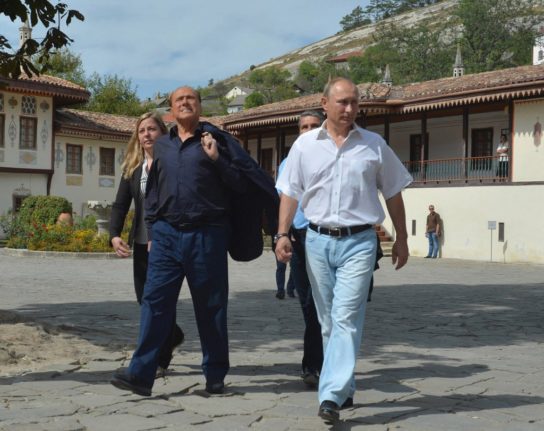
14.40 Berlusconi sets his sights on ‘director’ position in government
It might seem unbelievable that in 2022, scandal-plagued billionaire Silvio Berlusconi is preparing for yet another stint in government. But that seems to be what Italian voters have chosen.
A three-time prime minister who owns a large share of Italy’s media, as well as a Serie A football club, Berlusconi may be 85 but his political ambitions are far from over.
His Forza Italia party was celebrating on Monday after the right-wing coalition, led by Giorgia Meloni and her post-fascist Brothers of Italy party, triumphed in the polls.
Berlusconi, who has been on the political scene for 28 years, told reporters he would be a “father figure” to Meloni, 45, and fellow coalition partner Matteo Salvini, 49.
READ ALSO: Meloni, Salvini, Berlusconi: The key figures in Italy’s likely new government
He also said he would be a pro-European voice in what is expected to be Italy’s most right-wing government since World War II.
“I’m going to try to act as director in the government,” Berlusconi said.
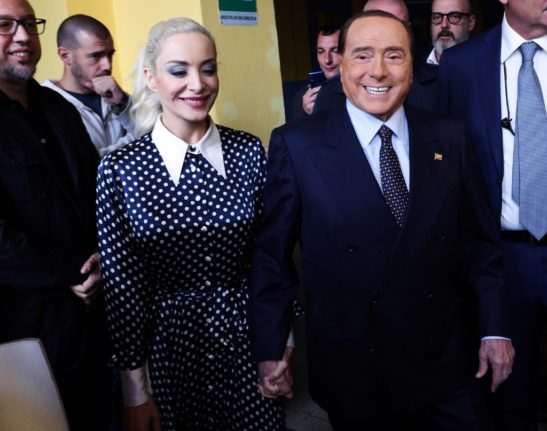
14.15 – Maps show almost all of Italy turning blue
The count is now almost complete, and maps showing how each part of Italy voted from various Italian news outlets are showing that the country has turned overwhelmingly blue – the colour of the right-wing alliance.
The below map shows how constituencies voted in the elections for the lower house. Every part of the country is now blue, except Naples and western Sicily, which are yellow, showing a majority for the Five Star Movement.
Elezioni, la mappa interattiva dei risultatihttps://t.co/Xud43ogfV5
— Quotidiani.net (@Quotidianinet) September 26, 2022
The northern region of Valle d’Aosta is shown in grey because it has a different voting system to the rest of Italy – it uses only the ‘uninominale‘ or first-past-the-post system, while the rest of Italy votes under a complicated hybrid electoral system.
See more here:
MAP: How Italy turned ‘blue’ in the latest elections
13.50 – Stark warning from Spain
While European countries with hard-right populist governments, like Poland and Hungary, have been enthusiastically congratulating Meloni on bringing a like-minded party to power in one of Europe’s biggest economies, Spain’s left-wing government warned that electing populists never ends well.
Spanish Foreign Minister José Manuel Albares said: “These are uncertain times and at times like this, populist movements always grow, but it always ends in the same way – in catastrophe – because they offer simple short-term answers to problems which are very complex.”
The leader of Spain’s own populist far-right party Vox tweeted in support of Meloni, who enthusistically supports the party despite insisting she doesn’t hold “far right” views herself.
Esta noche millones de europeos tienen sus esperanzas puestas en Italia.@GiorgiaMeloni ha mostrado el camino para una Europa orgullosa, libre y de naciones soberanas, capaces de cooperar para la seguridad y la prosperidad de todos.
Avanti @fratelliditalia pic.twitter.com/3bnVFA2B74
— Santiago Abascal 🇪🇸 (@Santi_ABASCAL) September 25, 2022
13.45 – Centre-left leader to step down after defeat
Enrico Letta, the leader of Italy‘s centre-left Democratic Party (PD), has confirmed that he plans to step down after his party’s defeat at election.
Letta announced at a press conference he would stay on as leader for now, but will not stand for the leadership at the party’s next congress in March.
He said victory for the right-wing alliance led by Giorgia Meloni was a “sad day for Italy and Europe”.
The largest party on the left, PD failed to form an election coalition able to mount a credible opposition to the right, and conceded defeat even during the election campaign – a move analysts have called “self-defeatist” and “political suicide”.
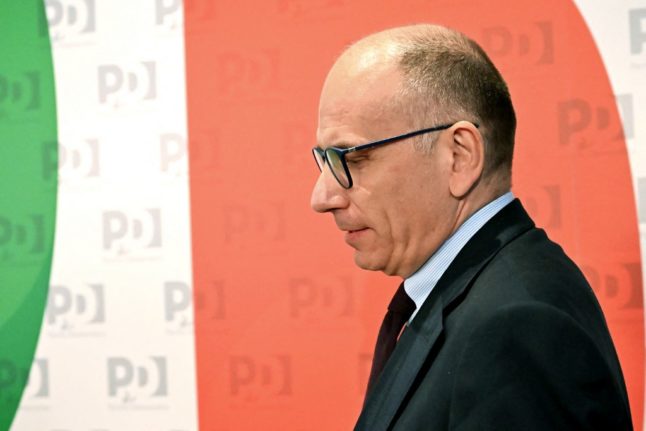
13.30 – Salvini disappointed at League election result
Anti-immigration League party leader Matteo Salvini spoke of his disappointment today at his party’s result in the polls, but said he would work with ally Giorgia Meloni, who triumphed, to form a “long-lasting” government.
His party took some nine percent of the vote, which he told reporters was “not a number I wanted or worked for”.
But he took comfort in the fact that his party would be part of the new right-wing coalition government.
“Around 4am I messaged Giorgia, who obviously I congratulate,” he added. “She was good, we will work together for a long time.”
The League has been eclipsed by Brothers of Italy, which appears to have taken much of its vote since Salvini took 17 percent of the vote in 2018 elections.
Brothers of Italy took around 26 percent, making it by far the largest party, with their coalition overall taking 44 percent.
A glum Salvini said Meloni had benefited from being the only party leader to stay outside the coalition formed by Prime Minister Mario Draghi in February 2021.
“Brothers of Italy was good at being a strong opposition,” he said.
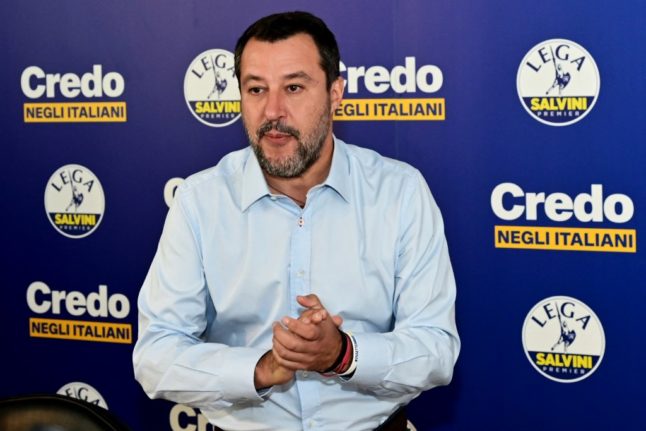
Whether or not the two party leaders will really be able to form a stable government is up for debate, as they’re known to disagree on everything from public spending to Russia.
Salvini said he hoped it would last “for at least five years straight, without changes, without upheavals, focusing on things to do”.
Italy has had three different governments since the last general election was held in 2018. Italian governments collapse frequently and easily, lasting around 18 months on average.
READ ALSO: Giorgia Meloni’s party will likely win the elections – but will it last?
12.50 – EU hopes for ‘constructive cooperation’ with new government
The European Commission on Monday said it hoped for a constructive relationship with the next government in Italy, set to be led by strongly Eurosceptic parties.
The commission, the EU’s executive, by principle works “with the governments that emerge from the elections,” said EU spokesman Eric Mamer at a news briefing.
“This is no different in this case. Of course we hope that we will have a constructive cooperation with the new Italian authorities,” he added.
League leader Salvini last week hit out at the Commission’s chief, Ursula von der Leyen, after she said the EU “tools” to manage trouble from Rome under a far-right government.
On Thursday, von der Leyen was asked if she had any concerns about the Italian elections and the predicted result.
“We’ll see. If things go in a difficult direction – I’ve spoken about Hungary and Poland – we have tools.,” she said.
“My approach is that whatever democratic government is willing to work with us, we’re working together.”
12.30 – Meloni claims victory on social media
Brothers of Italy leader Giorgia Meloni claimed an election victory for the coalition led by her far-right party in multiple posts to Twitter and Facebook on Monday morning, dedicating the anticipated win to “all the militants, (campaign) managers, and supporters”.
The war-like term militanti is a word used to describe particularly zealous and dedicated members of a cause, and is often used in connection with far-right groups.
Non tradiremo la vostra fiducia. Siamo #pronti a risollevare l’Italia
GRAZIE! 🇮🇹 pic.twitter.com/DabIIuhORK
— Giorgia Meloni 🇮🇹 ن (@GiorgiaMeloni) September 26, 2022
Meloni opened her post with the declaration “Today we have written history,” and concluded by vowing not to betray voters’ trust.
The Brothers of Italy leader also taunted her left-wing opponents on Facebook, writing ‘The Left defeated!’.
11.38 – Far right set to fall short of ‘super majority’
One question people in Italy have been asking throughout the election campaign is whether it could win a large enough share of the vote to form a government with a ‘super majority’ – a two-thirds majority of the seats in both houses of parliament. Read more about that here.
A government with such a large majority would be able to make changes to the political system itself, and therefore the constitution, without consulting voters via a referendum – including to how the president is elected, or the powers the prime minister has. It would be unprecedented in Italy’s post-war history.
Based on updated projections from broadcaster Rai News, the centrodestra coalition is set to win a clear simple majority of over half the seats in the lower and upper house, but will likely fall short of the numbers needed for a ‘super majority’.
Rai has revised its projections on the maximum share of seats that could go to the right slightly down since last night, now predicting the coalition will win 114-126 of 200 seats in the senate and 232-252 of 400 in the lower house.
Negli emicicli di Camera e Senato si evidenzia la maggioranza di seggi del Centrodestra#MaratonaYouTrend#ElezioniPolitiche2022 pic.twitter.com/HDyO10PQ8p
— YouTrend (@you_trend) September 26, 2022
If accurate, this would fall just short of the two-thirds majority the alliance would need to win in both houses to form a super majority.
10.42 – Poland’s PM congratulates Italy’s far right on ‘great victory’
Polish Prime Minister Mateusz Morawiecki congratulated Meloni on her projected win on Monday in a Facebook post with the words “Great victory! Congratulations!”, along with icons of the Italian and Polish flags and a ‘strength’ emoji.
Poland’s governing Law and Justice (PiS) party and the Brothers of Italy are both part of the right-wing European Conservatives and Reformists Group.
Other Polish governing politicians highlighted the overlap between the two parties, including their emphasis on Catholic family values.
“The EU right is growing stronger… We will defeat the communists, leftism and the LGBT lobby – everyone who is ruining our civilisation,” Deputy Agriculture Minister Janusz Kowalski said on Twitter.
Deputy Justice Minister Michal Wojcik said Meloni’s victory was a “defeat” for European Commission president Ursula von der Leyen, calling the latter a “representative of anti-democratic forces in the EU”.
10.37 – When do we get the official result?
Polling station staff have been counting ballots through the night and into this morning, and Italy expects full official results later today – though it’s not known what time.
Based on votes counted so far, early official result projections from the interior ministry show a clear-cut result.
As predicted by exit polls, the right-wing coalition has won with a large majority – though seat projections appear to show they are just short of the coveted ‘super majority’ threshold. Giorgia Meloni’s Fratelli d’Italia is the biggest party overall with, as expected, around 26 per cent of the vote.
Real-time results from the interior ministry appear to show that most ballots have now been counted, so we can expect an official result announcement within the next few hours.
10.20 – What policies will the new government implement?
The hard-right or so-called centrodestra coalition has centred its programme on lowering taxes, increasing Italy’s birth rate (among Italians), blocking ‘illegal’ immigration, reforming the country’s unemployment and benefits system, renegotiating the terms of its EU post-pandemic aid package with Brussels, and replacing Italy’s parliamentary democratic system with a French-style presidential system.
Brothers of Italy leader Meloni and League leader Salvini are both noted eurosceptics, but for now have promised a “full adherence to the European integration process” while seeking a “more political and less bureaucratic” bloc, in particular calling for a review of EU rules on public spending and economic governance.
Salvini and coalition partner Berlusconi have a long history of close relations with Russia, but the programme emphasises respect for commitments made as part of NATO and, a key point for Meloni, support for Ukraine in the face of Russia’s invasion.
Here’s a detailed look at what the new government will mean for Italy.
09.51 – What will Italy’s new government mean for foreigners?
The centrodestra alliance that is set to lead Italy’s next government is anti-immigration, most often framing the issue as a question of national security.
League party leader Matteo Salvini, well known for his populist, anti-immigration stance, is likely return to his previous post of interior minister, giving his party the biggest influence over policies affecting foreign nationals in Italy.
His party promotes a hard line against “illegal immigration”, with a heavy campaign focus on stopping migrant arrivals by sea from northern African countries. But the League also has a history of making life more difficult for documented immigrants and refugees.
A ‘security decree’ (often called the ‘Salvini Decree’) made applying for Italian citizenship a more difficult and uncertain process, and made it easier for the state to remove Italian citizenship from those who have naturalised.
While it seems likely that the League’s return to power would mean the return of such policies under new security decrees, there’s nothing in the manifesto or the debate so far which gives more concrete information on their plans, or on how the parties would treat legal migrants to Italy.
Find more on how a far right victory in Italy is set to impact foreigners’ lives here.
09.26 – What happens next?
The Interior Ministry will issue its official results via the Eligendo platform on Monday, after polls closed at 11pm local time on the 25th.
Once the result is announced, the winning party or coalition – in this case, almost certainly the Meloni-led hard-right centrodestra alliance – will form a new government. In Italy this process can take anywhere between four and 12 weeks.
Italy’s constitution requires that newly elected members of the Senate and the Chamber of Deputies meet no later than 20 days after elections, which would put their first gathering no later than October 15.
President Sergio Mattarella will start consultations on who should lead the next government and will nominate a prime minister. The new PM will accept the mandate and start forming a cabinet and firming up a programme, following which the new government is sworn in.
A detailed timeline of what happens next can be found here.
08:53 – France wants ‘respect’ of human rights, abortion in Italy: PM
France will be “attentive’ to the respect of the right to abortion and other human rights in Italy following the election victory of far-right leader Giorgia Meloni, Prime Minister Elisabeth Borne said Monday.
“Obviously we will be attentive, with the president of the European Commission, that these values of human rights, the respect of one another, notably the respect of abortion rights, are respected by all,” Borne told BFM television.
08:40 – Meloni to govern ‘for all Italians’
Speaking after projections were in Giorgia Meloni said voters had sent a “clear message” of support for her party to lead their right-wing coalition to power.
“If we are called to govern this nation we will do it for all Italians. We will do it with the aim of uniting people, of enhancing what unites them rather than what divides them,” she told reporters.
Meloni, who campaigned on a motto of “God, country and family”, is expected to become Italy’s first female prime minister, although the process of forming a new government could take weeks.
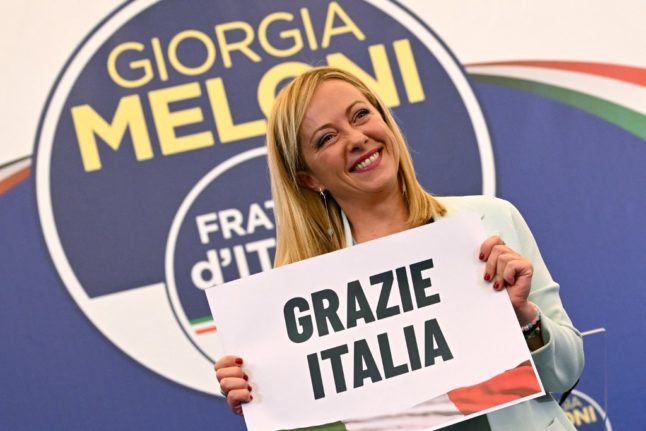
NEW: 08.21 – Italy’s far right set to dominate in parliament
Good morning and welcome back to The Local’s live blog on the Italian election result.
The first projections, based on actual votes, came in overnight and nothing has changed.
Italy’s hard-right centrodestra coalition is set to win power in Italy, having claimed just over 44 percent of the vote as of Monday morning. The count is currently still in progress, but the result is already clear.
As things stand, Giorgia Meloni’s far-right Brothers of Italy party is now the largest in Italy, with over 26 percent. Her coalition partners, Berlusconi’s Forza Italia and the hard-right populist League, have taken just 8.3 and 9 percent percent respectively.
The centrosinistra centre-left coalition have performed poorly, attracting just 26.1 percent of votes; on early Monday they conceded defeat, saying they would be the largest opposition force to the next government.
01.10 – That’s all for now
It’s getting late and we’re going to wrap this blog up for the night. Thanks to everyone who has followed our updates on this historic election.
The count will continue through the night, with the results for the Senate to come before counting begins for the Lower House. You can see the current official results as they come in on the Interior Ministry’s official election website here. Concrete results are expected by around 7-8am on Monday.
We’ll be back then with all the news and reaction.
Here’s a quick recap of the main points from tonight
- The right-wing alliance led by Giorgia Meloni’s post-fascist Brothers of Italy party is set to win the election with a large majority, as predicted, according to exit polls tonight.
- As leader of the largest party in the coalition (and overall) Meloni would be on course to become Italy’s first ever woman prime minister
- A Meloni-led government would be the most far-right government in Italy since the Second World War.
- Voter turnout fell again: it was just below 64 percent, nine points less than at the last election in 2018 and the lowest in the history of the Republic.
00.55 – Hungary’s Viktor Orban congratulates Meloni
Hungary’s prime minister Victor Orban has sent a message of congratulations to Giorgia Meloni on her expected victory via his political director Balazs Orban.
“In these difficult times, we need more than ever friends who share a common vision and approach to Europe’s challenges,” he said.
🇮🇹👏Congratulations @GiorgiaMeloni, @matteosalvinimi, @berlusconi on the elections today! In these difficult times, we need more than ever friends who share a common vision and approach to Europe's challenges.
🇭🇺🤝🇮🇹Long live the Hungarian-Italian friendship! pic.twitter.com/4PN2ZDEJoZ
— Balázs Orbán (@BalazsOrban_HU) September 25, 2022
Poland’s right-wing prime minister Mateusz Morawiecki also tweeted his congratulations to Giorgia Meloni.
These hard-right populist governments will gain a major boost from having an ally in Italy, which is a member of G7 and Nato.
00.30 – Who makes up the likely new Italian government?
While all the talk has been about Giorgia Meloni and her far-right Brothers of Italy party it’s important to remember that the next Italian government (if exit polls are correct) will be an alliance of probably three right-wing parties.
Along with Meloni’s Brothers of Italy (FdI) the government will likely feature coalition partners Matteo Salvini’s far-right League and former prime minister Silvio Berlusconi’s Forza Italia. Yes it’s hard to believe that Berlusconi and his party will once again be part of an Italian government, but that looks likely to be the case (although there have been suggestions Meloni and Salvini could form a coalition without him if they take enough of the vote).
Here’s a reminder of who they are.
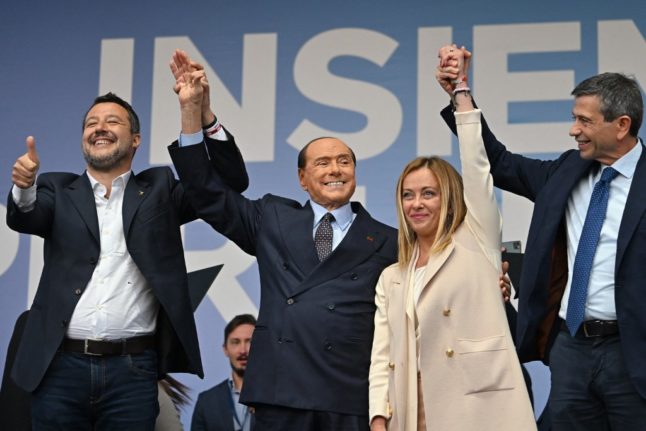
00.20 Has the right won a ‘super majority’?
If the exit polls and projections so far are confirmed, it’s beyond doubt that Italy’s right-wing bloc has won a majority.
But one question people in Italy have been asking throughout the election campaign is whether it could win a large enough share of the vote to form a government with a ‘super majority’ – a two-thirds majority of the seats in both houses of parliament. Read more about that here.
A government with such a large majority would be able to make changes to the political system itself, and therefore the constitution, without consulting voters via a referendum – including to how the president is elected, or the powers the prime minister has.
This would be unprecedented in Italy’s postwar history.
Until the final results arrive in a few hours’ time, we won’t know for sure. But here’s the proportion of seats each party or alliance is expected to get in each house according to analysis of projections by national broadcaster Rai:
Seats in the lower house (Chamber of Deputies) total seats available: 400
Right-wing alliance: 227-257
Centre-left alliance: 78-98
Five Star Movement 36-56
‘Third pole’: Action and Italia Viva 15-25
Italexit 0
Others 3-5
Seats in the Senate (200)
Right: 111-131
Centre-left: 33-53
Five Star Movement: 14-34
‘Third pole’: 4-12
Italexit 0
Others 3-5
These numbers show that the right-wing alliance is projected to fall just short of winning the coveted two-thirds majority in both houses.
00.20 – First projections for the Senate
The first projections are now starting to come in. These are based on the actual votes cast so far and so are much more reliable than exit polls – though this is still not the official result.
The projections for the upper house give Meloni’s far-right Brothers of Italy 24.6 percent of the vote, and the centre-left Partito Democratico comes second with 19.4 percent.
The Five Star Movement are set to take 16.5 percent.
More importantly for Meloni, her coalition partners the League and Forza Italia get 8.5 percent and 8 percent respectively.
Votes for the Senate are counted first, so we won’t see similar figures for the lower house until later.
00:05 How did each part of Italy vote?
The breakdown of the vote on a geographical basis won’t be known for certain until all the results are in of course, but according to one exit poll that you can see in the tweet below much of Italy has turned blue – the colour that represents the right-wing alliance.
The map on the left is for the lower house and the map on the right is for the Senate. These are based on exit polls.
🔴 La nostra stima dei collegi uninominali basata sul nostro instant poll per @SkyTG24#MaratonaYouTrend#ElezioniPolitiche2022 pic.twitter.com/iqfsTuP718
— YouTrend (@you_trend) September 25, 2022
23.50 – Salvini says right wing bloc has “clear advantage”
The leader of the hard-right anti-immigrant League party Matteo Salvini, whose party will likely be part of a new right-wing government, said the exit polls showed they had a clear advantage in both houses of parliament.
“It will be a long night, but already now I want to say THANK YOU,” said Salvini in a tweet.
Centrodestra in netto vantaggio sia alla Camera che al Senato!
Sarà una lunga notte, ma già ora vi voglio dire GRAZIE❤️💪— Matteo Salvini (@matteosalvinimi) September 25, 2022
23:40 Huge challenges facing Italy’s next PM
Just to give an idea of the challenge facing Giorgia Meloni if she does take charge of Italy’s next government, here are a couple of lines from AFP:
“Like much of Europe, Italy is suffering rampant inflation while an energy crisis looms this winter, linked to the conflict in Ukraine.
The Italian economy, the third largest in the eurozone, is also saddled with a debt worth 150 percent of gross domestic product.”
| Banner ad |
Is Giorgia Meloni and the Brothers of Italy party far-right?
Giorgia Meloni presents herself as a patriotic “Christian mother”, and as a straight-speaking Roman raised by a single mother in a working-class neighbourhood. In fiery speeches, Meloni rails against what she calls “LGBT lobbies”, “woke ideology” and “the violence of Islam”.
She has vowed to stop the tens of thousands of migrants who arrive on Italy’s shores each year, a position she shares with Salvini, who is currently on trial for blocking charity rescue ships when he was interior minister in 2019.
READ ALSO: Political cheat sheet: Understanding the Brothers of Italy
The centre-left Democratic Party says Meloni is a danger to democracy. It also claims her government would pose a serious risk to hard-won rights such as abortion and will ignore global warming, despite Italy being on the front line of the climate emergency.
On the economy, Meloni’s coalition pledges to cut taxes while increasing social spending, regardless of the cost.
But just how far right is she and her party? We explore that question in the article below.
EXPLAINED: Is Brothers of Italy a ‘far right’ party?

23.25: Meloni looks set to be Italy’s first woman PM if exit polls confirmed
With exit polls (below) suggesting the far-right Brothers of Italy party will come out on top, that means Italy looks set to get its first woman as prime minister.
As head of the party with the most votes, Giorgia Meloni would be expected to lead a right-wing coalition government. However there are suggestions that her coalition partner, League leader Matteo Salvini, might also try to make a bid to become PM.
But with Meloni’s party expected to win double the share of Salvini’s according to exit polls, it’s hard to imagine Salvini being able to wrestle the position of coalition leader and prime minister away from Meloni
| Banner ad |
23.20 Exit polls show big victory for far right
More exit polls are coming in now and, while the percentages vary slightly, they all show the same thing: Meloni’s Fratelli d’Italia (FdI) party and the right-wing coalition with her allies, Matteo Salvini’s far-right League and former prime minister Silvio Berlusconi’s Forza Italia, was expected to win a clear majority in both houses of parliament.
Exit polls published by the Rai public broadcaster and Quorum/YouTrend both put Brothers of Italy on top, at between 22 and 26 percent of the vote.
🔴 TREND POLL @swg_research per @TgLa7#MaratonaYouTrend#ElezioniPolitiche2022 pic.twitter.com/7cZfQU0SXY
— YouTrend (@you_trend) September 25, 2022
23.10 First exit polls
Polling company Youtrend just presented the first exit poll, giving a large majority to the right-wing bloc, as expected.
It put the right on 42 percent, with the small centre-left coalition led by the PD on 28 percent. This is more or less in line with opinion polls two weeks ago.
🔴 INSTANT POLL Quorum/YouTrend per @SkyTG24#MaratonaYouTrend#ElezioniPolitiche2022 pic.twitter.com/hH0HrCP5ek
— YouTrend (@you_trend) September 25, 2022
Remember these are exit polls and not the official results. There are several other polling companies conducting exit polls tonight, so we’ll also publish those results when they’re out.
23.00 Polls closed
That’s all, folks. Voting is now over, polling stations are closing their doors, and the first exit polls with predicted results will come out within the next half an hour.
22.55 – Campaign blackout?
Election campaigning was supposed to end officially on Friday night, when a blackout begins before the vote to give voters a “period of contemplation”.
Of course campaign blackouts aren’t that realistic in the time of social media though and it just means candidates get creative with their messaging.
Take for example this TikTok video posted by FdI leader Giorgia Meloni today:
Giorgia Meloni holding two melons – and yes, this is a real video posted by her on TikTok.
Sept 25, 2022 pic.twitter.com/egakcD8jf8
— Crazy Ass Moments in Italian Politics (@CrazyItalianPol) September 25, 2022
She’s saying “September 25th – I’ve said it all” – a reference to the fact that she’s not really meant to be saying anything. And yes, her surname means ‘melons’.
22.30 What are the expected results?
This definitely hasn’t been an election campaign that has kept us on the edge of our seats.
The prediction from the start of the election campaign has been that the right-wing coalition led by Giorgia Meloni’s Brothers of Italy party will win by a landslide, allowing it to form a government with a large majority.
The most recent opinion polls, published two weeks ago before the pre-election polling embargo began, showed this was by far the most likely outcome.
Italian elections: What’s the difference between a majority and ‘super majority’?
| Banner ad |
But after what’s been called “one of the worst election campaigns of the post-war period”, with the result looking sure from the start and a severe shortage of any policy to discuss, is there any chance of a surprise result livening things up?
Probably not, the experts say – although voter sentiment has apparently shifted somewhat since the last polls two weeks ago.
Support for the left-leaning Five Star Movement appears to have surged while the hard-right League is flagging, according to pollsters interviewed by Reuters this week.
Still, most said the prediction that the right will take a majority in both houses of parliament and form the next government remains by far the most likely outcome, even if it has been thrown into doubt somewhat by Five Star’s rise.
The polls close in half an hour, and we won’t have much longer to wait after that for the exit polls, which give us an initial, if imperfect, idea of whether the long-predicted result is likely to become reality.
21.50 Long queues, but lower turnout
Long queues were reported at some polling stations around the country today, in some cases with voters queuing before they opened at 7am – leading to speculation that there would be higher turnout than in the 2018 election
But it looks like turnout is in fact lower, according to interior ministry figures, which put it at 51 percent at 7pm – four hours before polls closed – down from 58 percent.
EXPLAINED: Who’s who in Italy’s general election?
The lowest turnout was in the south and islands, according to analysis of the official data by Youtrend, at 40 percent – 12.1 percent lower than in 2018. Political commentators are saying this is likely bad news for the Five Star Movement, which won most of its support from southern regions in 2018.
This highest turnout at 56 percent was in the north-west, which also happens to be where the far-right Brothers of Italy party and the League (formerly the Northern League) have their biggest support base.
Affluenza parziale ore 19 per area geografica:
Nord Ovest 56,1% (-6,4% nel 2018)
Nord Est 56,1% (-7,3%)
Zone rosse (EMR, TOS, MAR, UMB) 57,6% (-6,5%)
Centro-Sud (LAZ, ABR, MOL) 51,4% (-5,9%)
Sud+Isole 40,0% (-12,1%)#MaratonaYouTrend#ElezioniPolitiche2022— YouTrend (@you_trend) September 25, 2022
Another interesting bit of analysis from Youtrend: turnout is down much more in municipalities with fewer foreign residents (-10.6%) and is down much less in areas where more foreigners live (-5.4 %). “The more foreigners there are, the less the turnout falls”, Youtrend notes.
| Banner ad |
Lower turnout overall this time isn’t a surprise. Abstentionism was expected to increase, with opinion polls during the election campaign predicting as many as 16 million voters would refrain from voting – Italy has a voting population of just over 46.5 million.
Italian affluenza or voter turnout is generally fairly high by international standards: 73 percent of eligible voters voted in the last parliamentary election in 2018 – though this was the country’s worst-ever rate of participation, and the number has been steadily dropping for years.
Italy’s political leaders were pictured turning out for the vote. Here’s outgoing prime minister, Mario Draghi, who’s not campaigning for re-election and has made it clear he’s not interested in another term.
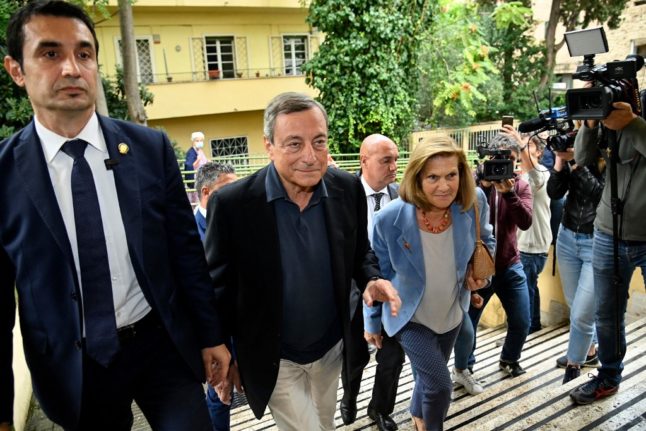
21.30 When do we get the first results?
Polls close at 11pm and counting starts immediately after.
The first exit polls from the country’s leading news media should be out by 11.30. Though they are usually fairly close to the mark, exit polls can’t be relied upon entirely, as the 2013 exit poll debacle showed.
The time needed to announce the first official results depends on how many ballots there are to count. Turnout is expected to be similar to that at the last election in 2018 – maybe slightly lower – so Italian media are predicting 2am for the first official projections based on data from polling stations. Or maybe 3am. We could be in for a long night.
READ ALSO: An introductory guide to the Italian political system
Ballot papers for the election of the Senate are counted first. When that’s complete, volunteers will turn their attention to counting ballots for the lower house of parliament.
| Banner ad |
21.00 Italy’s election night begins
Buonasera a tutti and welcome to The Local’s 2022 Italian election blog. There’s a lot at stake in these crucial elections as far right parties Brothers of Italy and the League are expected to win by a landslide.
Voting will close in two hours and we expect the first exit polls shortly after (you can read more here to get a sense of when things will happen tonight), but before then we’ll keep you posted with the latest news, predictions, expert insights and more.
READ ALSO: Far-right Brothers of Italy eyes historic victory as Italy votes
I’m The Local Italy’s editor Clare Speak and I’ll be updating you tonight as the exit polls and first results start to come in.
If you have questions, comments or feedback, please feel free to email or tweet me and I’ll do my best to answer (depending on how busy things get here tonight).
No matter how you feel about the election, I hope you’ll at least enjoy our coverage.
Not sure what to make of it all? Here’s our complete guide to the elections and what’s at stake.
Are you a member of The Local? If not, please consider joining us. If yes, thank you – your support helps us dedicate time and resources to this.

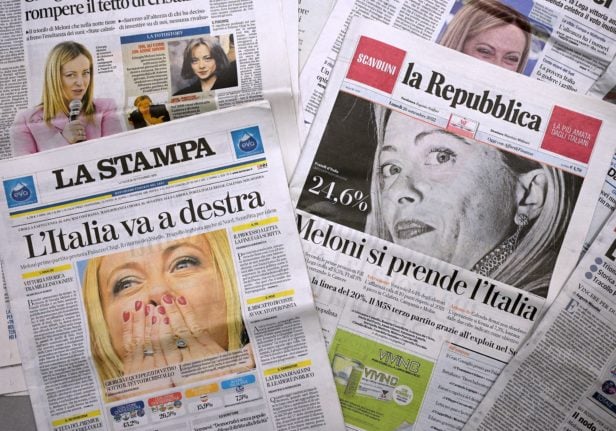
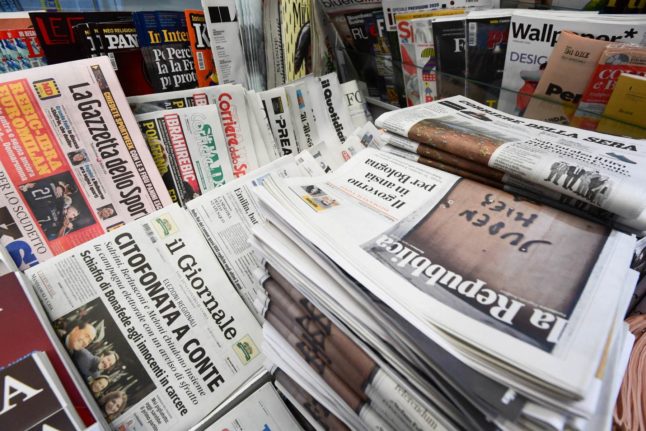
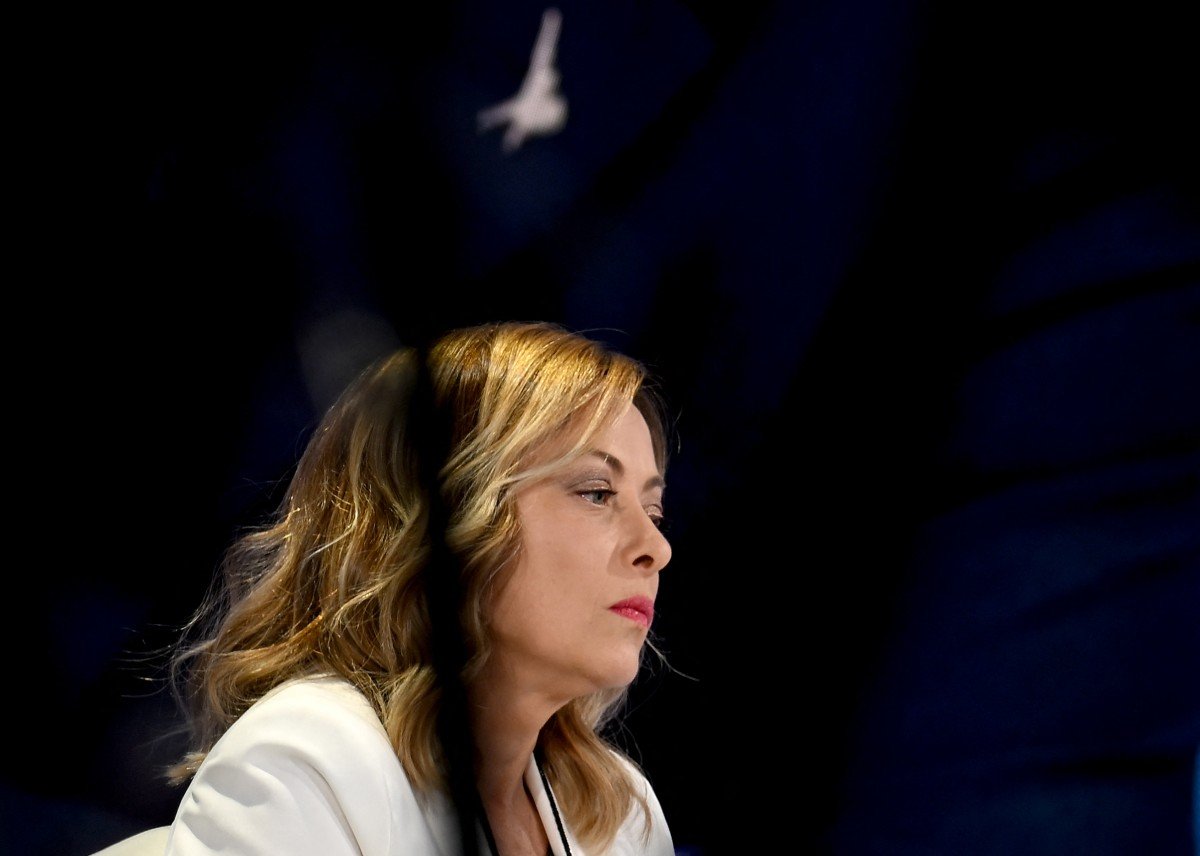
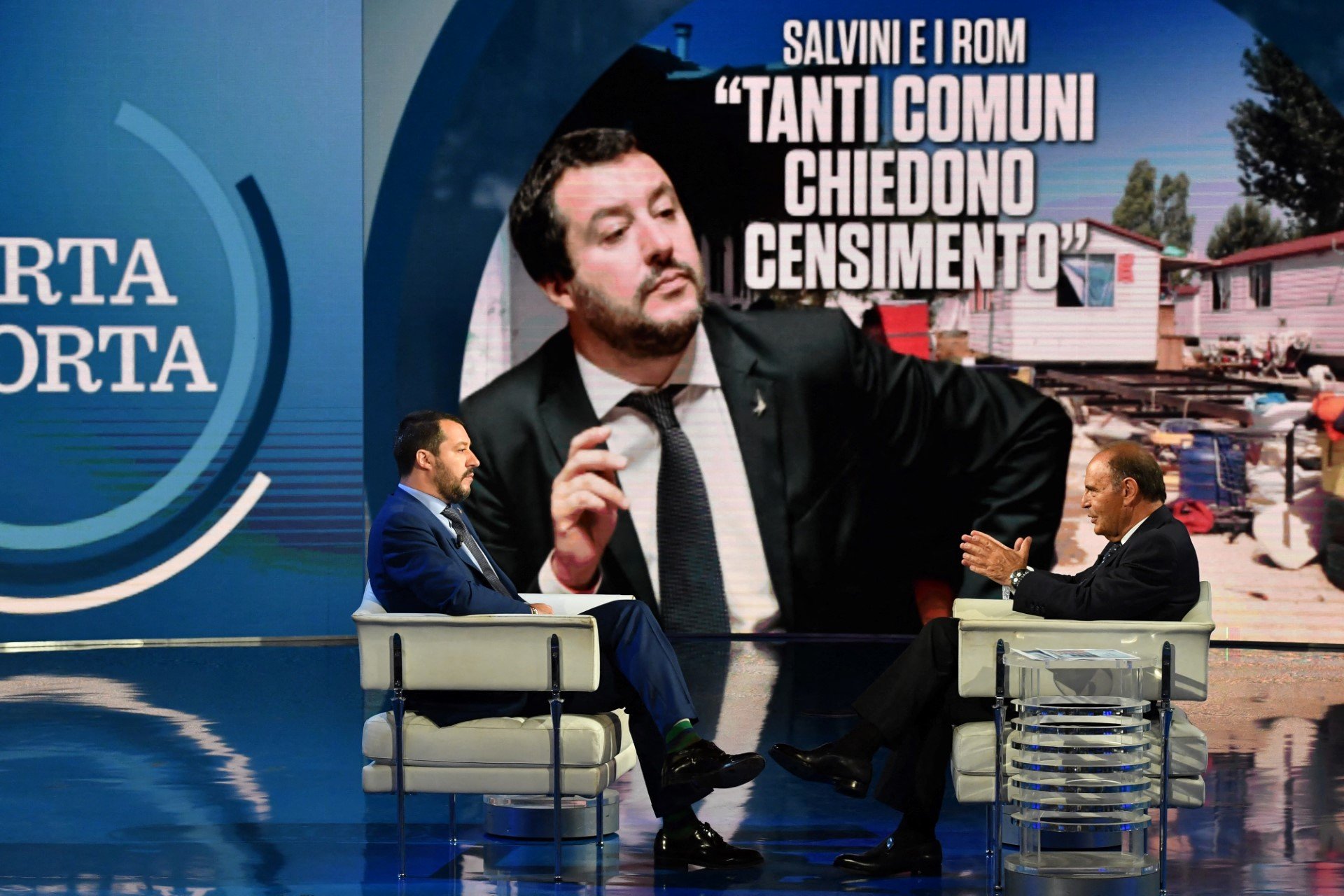
 Please whitelist us to continue reading.
Please whitelist us to continue reading.
Member comments